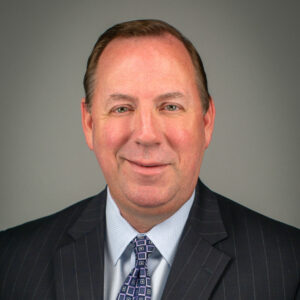Writer: Jerrica DuBois
2 min read May 2022 — There are some industries that are constant. There will always be a need for them, no matter what the state of the world looks like. Accounting falls on that list. Larry Autrey, managing partner at Whitley Penn, and Ozan Gursel, senior managing director at Riveron, shared with Invest: their thoughts on the challenges and successes of the industry in the Dallas-Fort Worth metroplex.
What is the current state of the accounting and tax services sector in North Texas?
 Larry Autrey: The market is booming. It’s a net migration state and we’re seeing a lot of people coming in. In the neighborhood that I live in, probably half of the people who have moved into the neighborhood in the last year have come from California, a third has come from the Chicago area and a third from other places. In a lot of cases, the CEO is in a place where they can move the corporate headquarters and maybe not move the operations and they choose to move here. They’ll call themselves political or tax refugees.
Larry Autrey: The market is booming. It’s a net migration state and we’re seeing a lot of people coming in. In the neighborhood that I live in, probably half of the people who have moved into the neighborhood in the last year have come from California, a third has come from the Chicago area and a third from other places. In a lot of cases, the CEO is in a place where they can move the corporate headquarters and maybe not move the operations and they choose to move here. They’ll call themselves political or tax refugees.
What is your outlook for the professional services industry in Dallas-Fort Worth over the next two to three years?
 Ozan Gursel: We have a multiyear trend of large companies relocating here and two of them are our biggest clients at the moment. If new businesses are moving in and they can’t retain staff from old locations, we’ll fill in the gaps and help set up back-office operations. I don’t see that abating any time soon. We also have great schools across the metroplex for finance, accounting and business analytics talent, including the University of Texas at Dallas, Southern Methodist University, Texas Christian University, University of North Texas and the University of Texas at Arlington. These will continue to feed the supply-side of the industry. On the demand side, we have certain expectations around inflation. If the Fed raises rates and it’s worse than expected, the market might soften. But even if we did six or seven quarter-point rate increases, we’d still only be back to 2019 levels. I expect that M&A activity will continue to be strong in the private equity space and that companies will be going back to more traditional IPOs and direct listings in the capital markets space.
Ozan Gursel: We have a multiyear trend of large companies relocating here and two of them are our biggest clients at the moment. If new businesses are moving in and they can’t retain staff from old locations, we’ll fill in the gaps and help set up back-office operations. I don’t see that abating any time soon. We also have great schools across the metroplex for finance, accounting and business analytics talent, including the University of Texas at Dallas, Southern Methodist University, Texas Christian University, University of North Texas and the University of Texas at Arlington. These will continue to feed the supply-side of the industry. On the demand side, we have certain expectations around inflation. If the Fed raises rates and it’s worse than expected, the market might soften. But even if we did six or seven quarter-point rate increases, we’d still only be back to 2019 levels. I expect that M&A activity will continue to be strong in the private equity space and that companies will be going back to more traditional IPOs and direct listings in the capital markets space.
How have you capitalized on recent technological developments?
Autrey: Part of what we learned in the last couple of years is that we don’t have to always get together in person. We probably have more client conversations online than we ever would. I think you see much more efficiency with that, given less travel outside the market because we can handle some of those meetings in remote offices.
Automation is another good example, such as the OCR software. That software has gotten so much better. I can feed in a document that’s maybe not as clear as it should be and pull it straight into the software, which in the past we couldn’t do. We’re seeing software progress at such a level that we will use more of it as we go forward. Everything is getting easier to use, more available and more applicable.
Gursel: Even 15 years into the cloud computing revolution, people are still doing cloud migrations of their ERP and CPM systems, and so we’re helping with that. When it comes to forecasting and modeling, people are using larger datasets. Making decisions based on basic financial spreadsheets takes a long time and doesn’t give you the whole picture. You can make decisions based on pure financial metrics and miss things like customer demographic implications that may lead you to keep a retail store open when the financial performance isn’t what it should be.
In accounting, we are doing a lot of basic automation, especially for payment and procurement processes as well as financial close. We’re also encouraging our accounting professionals to develop new technical skills. I have accountants who know tools and programming languages, such as SQL, Python, UiPath, and Alteryx, and there will be more of that moving forward. It allows us to provide more integrated service delivery to our clients.
What industries have had the most demand for your services in the North Texas region over the last year?
Autrey: Real estate is booming, so we see a lot of need in that area from the accounting and tax side of things. Clients have concerns about paying too much in taxes, lenders have concerns about whether the financial statements are properly presented. We do a lot of work in that space. There’s also a lot of money raised in the Dallas-Fort Worth area that goes into the oil and gas sector. That’s been an interesting rollercoaster over the last year.
Gursel: There is a war for talent out there and I haven’t seen anything like this since the dot-com craziness of 1999. One of our practice areas is accounting operations, which is a mix of outsourced accounting services, interim management, and getting in and driving more efficiency in operational accounting so it’s less labor intensive. Because people are struggling to hire accountants, we are seeing more demand in this practice area than we have ever seen. We have clients who have used us for other services in the past now coming to us for operational accounting support as well.
For more information, visit:
